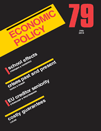Lucas, D. (2014) “Evaluating the cost of government credit support: the OECD context“. Economic Policy, Vol. 29, Issue 79, pp. 553-597.
Governments throughout the OECD allocate a large share of societies’ capital and risk through their credit-related activities. Hence, accurate cost estimates for credit support programmes are a prerequisite for efficient resource allocation, transparency, effective management and public oversight. I find that OECD governments generally take their cost of capital to be their own borrowing rate, rather than using a weighted-average cost of capital that includes the cost of risk borne by taxpayers and the general public in their role as equity holders. That practice, which is institutionalised in government accounting and budgetary rules, results in cost estimates for credit support that are significantly downwardly biased relative to a fair-value metric that recognises the full cost of risk. The size and possible real consequences of those distortions are illustrated with analyses of the European Bank for Reconstruction and Development, the European Stability Mechanism and the Tennessee Valley Authority.
Σχετικές αναρτήσεις:
- Ball, M. L. (2014) “Long-Term Damage from the Great Recession in OECD Countries“, NBER Working Paper No. 20185, Μάιος.
- OECD (2013) OECD Economic Surveys: Greece 2013, Paris: OECD Publishing.
- OECD (2013) OECD Economic Outlook, Vol. 2013/2, OECD Publishing.




